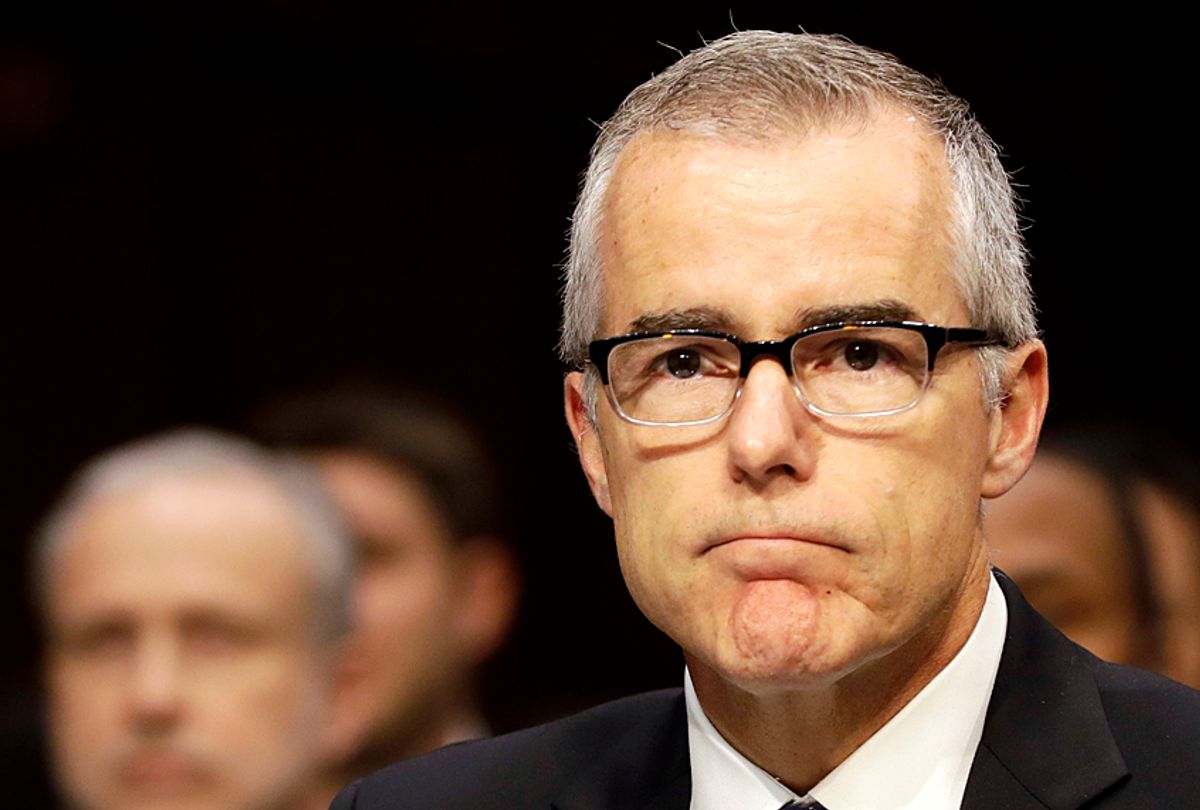During an appearance on CBS' "Face the Nation" on Sunday, former FBI Deputy Director Andrew McCabe expressed "shock" at the light sentence received by former Donald Trump campaign chairman Paul Manafort.
"Well I was really surprised by the sentence he was given," McCabe told host Margaret Brennan. "I think it's an incredibly lenient sentence in light not just of the — of the offenses he was convicted for but the additional offenses that he has pled guilty to in D.C. and the offenses he's acknowledged essentially, in the sentencing process in Virginia, that he is res- responsible for. So like most people I was shocked by how lenient the sentence was."
Brennan then asked McCabe if he believes the court in Washington D.C. (where Manafort faces an additional sentencing within the next few days) will attempt to rectify the situation by adding to his current sentence. Manafort received only 47 months in prison by Judge T. S. Ellis, far lower than the 20-plus years recommended by prosecutors and consistent with the sentencing guidelines.
"Well there's no question he's going to get additional time from D.C. I don't think it's probably the- the job of the D.C. courts to rectify a mistake or — or something that was done in another jurisdiction. I'm sure that Judge [Amy Berman] Jackson will approach her sentence with just keeping our eye on the facts of that case but there's no doubt he'll get additional time from that process," McCabe told Brennan.
One possible explanation for Manafort's light sentence was the hostile attitude of Judge T. S. Ellis, who was appointed by President Ronald Reagan, toward special counsel Robert Mueller's investigation and the prosecutors in general. In May, before the trial had concluded, Ellis scolded the prosecutors by telling them that "you don’t really care about Mr. Manafort’s bank fraud. You really care about getting information Mr. Manafort can give you that would reflect on Mr Trump and lead to his prosecution or impeachment." On two occasions Ellis interrupted Assistant U.S. Attorney Uzo Asonye to criticize his opening statement, was observed rushing prosecutors as they attempted to connect the dots in their case and even insulted lead prosecutor Greg D. Andres by claiming in a private conference at the bench that "there’s tears in your eyes right now." When Andres denied it, Ellis insisted that "they are watery."
When sentencing Manafort, Ellis said that he believed the sentencing recommendations in general for fraud on tax and foreign banking disclosures were too steep and added that Manafort "is not before the court for any allegation that he or anybody at his direction colluded with the Russian government to influence the 2016 presidential election," according to CNN. He made it clear that he thought the advisory sentence for Manafort was excessive and added, "Clearly the guidelines were way out of whack on this, as the history of the sentences in this area show. It's a fundamental principle of justice that like cases should be treated alike, and if they're treated differently, there ought to be a good reason for it."
When McCabe was asked whether Ellis may have been influenced by President Trump's comments defending Manafort and denouncing the investigation, McCabe said he did not think that was the case.
"I don't. I don't," McCabe told Brennan. "But the point that I try to make in the book is that — it's to try to highlight how incredibly irresponsible and indeed corrosive statements like that from the chief executive are on the process and on the public's perception of the fairness and the effectiveness of the process. When the president engages in messaging like that people can't help but step back and ask themselves that question that you just asked, did that have an impact on the process or on the result in this case. We don't know the answer to that but it introduces a level of doubt and insecurity into a system that we all need to depend on- upon to being fair and free."



Shares